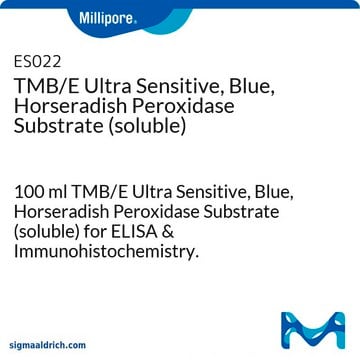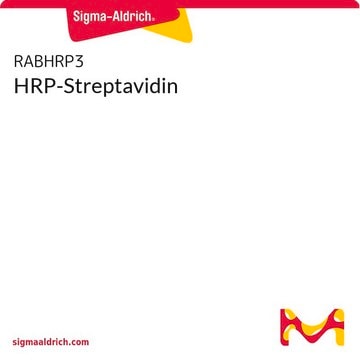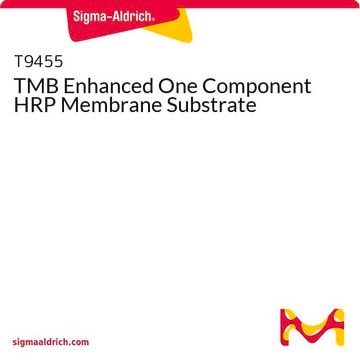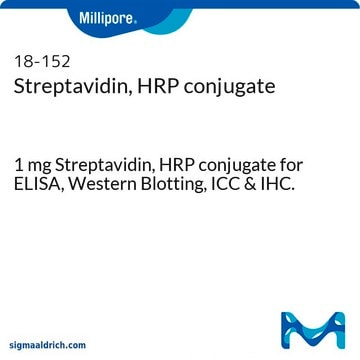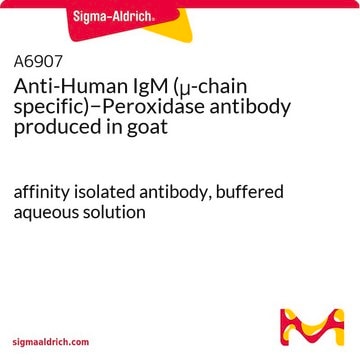ES001
TMB/E Single Reagent, Blue color, Horseradish Peroxidase Substrate (soluble)
500 ml TMB/E Single Reagent, Blue color, Horseradish Peroxidase Substrate (soluble) for ELISA.
Synonyme(s) :
HRP substrate, TMB
Se connecterpour consulter vos tarifs contractuels et ceux de votre entreprise/organisme
About This Item
Code UNSPSC :
41116010
eCl@ss :
42029053
Nomenclature NACRES :
NB.22
Produits recommandés
Forme
liquid
Fabricant/nom de marque
Chemicon®
Technique(s)
ELISA: suitable
λmax
450 nm
Conditions d'expédition
wet ice
Description générale
TMB, (3,3′,5,5′-tetramethybenzidine) has been shown to be a safe-sensitive substrate for the assay of HRP. Initially, in the presence of HRP and hydrogen peroxide, a one-electron oxidation product is formed. This compound, a cation free radical, is blue in color with an adsorption maximum of 653 nm. Further reaction with HRP/H2O2 or acidification of the radical with acid yields the diimine terminal oxidation product adsorbing light at 450 nm. The extinction coefficient of the radical (E653nm=3.9 x 104 mol-1 cm-1) and diimine (E450nm=5.9 x 104 mol-1 cm-1) provide a remarkably sensitive system for the assay of HRP and HRP labeled probes. ES001 is a single component reagent stable at room temperature and not sensitive to normal laboratory light. It is optimized with respect to TMB and hydrogen peroxide concentrations and yields a linear response with the concentrations of HRP usually employed in immunological assays.
Application
METHOD SYNOPSIS:
After completion of analyte binding to a solid phase and reaction with a HRP labeled probe, ES001 is added. Oxidation of TMB produces a blue reaction product that is measured at 650 nm. The color formation as a function of time can be recorded or the reaction stopped with sodium fluoride after a fixed interval. Increased sensitivity can be achieved by converting the blue radical to the diimine by addition of acid. The resulting yellow color is measured immediately at 450 nm.
SAMPLE PROCEDURE
1. Complete all required incubations with antibodies, probes, HRP labeled reagents.
2. Wash plate at least 4 times with PBS or Tris buffered saline containing 0.1% Tween-20.
3. After the final wash, shake and blot all residual buffer from plate wells.
4. Add 0.1 mL of ES001 (TMBE Solution) to appropriate wells and incubate 5-30 minutes.
Note: The reaction time will depend upon the activity of the HRP probe. If color develops too briskly, zero order kinetics will not prevail. Dilution of the probe, antibody or HRP labeled reagent may be required.
5. The reaction can be monitored as a function of time for kinetic assays or stopped with 0.1 mL of 0.1% sodium fluoride and read at 650 nm.
6. If the procedure demands conversion to the yellow diimine, add 0.1 mL of either acid described in the reagent section above and record the absorbance within 5 minutes.
Variations of time, reagent volume and temperature require standardization by the user.
After completion of analyte binding to a solid phase and reaction with a HRP labeled probe, ES001 is added. Oxidation of TMB produces a blue reaction product that is measured at 650 nm. The color formation as a function of time can be recorded or the reaction stopped with sodium fluoride after a fixed interval. Increased sensitivity can be achieved by converting the blue radical to the diimine by addition of acid. The resulting yellow color is measured immediately at 450 nm.
SAMPLE PROCEDURE
1. Complete all required incubations with antibodies, probes, HRP labeled reagents.
2. Wash plate at least 4 times with PBS or Tris buffered saline containing 0.1% Tween-20.
3. After the final wash, shake and blot all residual buffer from plate wells.
4. Add 0.1 mL of ES001 (TMBE Solution) to appropriate wells and incubate 5-30 minutes.
Note: The reaction time will depend upon the activity of the HRP probe. If color develops too briskly, zero order kinetics will not prevail. Dilution of the probe, antibody or HRP labeled reagent may be required.
5. The reaction can be monitored as a function of time for kinetic assays or stopped with 0.1 mL of 0.1% sodium fluoride and read at 650 nm.
6. If the procedure demands conversion to the yellow diimine, add 0.1 mL of either acid described in the reagent section above and record the absorbance within 5 minutes.
Variations of time, reagent volume and temperature require standardization by the user.
Forme physique
Color Code: Yellow
REAGENT PROVIDED:
Liquid solution containing TMB, 1.25 mMol/L and Hydrogen Peroxide, 2.21 mMol/L and less than 1% dimethyl sulfoxide in a 0.08 Mol/L) acetate buffer at pH 4.9. Also contains non-toxic proprietary stabilizers.
Materials Required:
Reagents Required for Stopping the Reaction, But Not Provided
A. Sodium fluoride, 0.1% for stopping the reaction and preserving blue chromogen. Prepare by dissolving 1 g of sodium fluoride in 1 liter of reagent grade water. Observe all precautions on label for use of sodium fluoride.
B. Acid for stopping the reaction and converting the blue radical to the yellow diimine. Either 0.5 Mol/L sulfuric acid or 0.25 Mol/L hydrochloric acid may be used. THE ABSORBANCE MUST BE OBTAINED WITHIN 5 MINUTES AFTER ADDING THE ACID.
Note: Reagent grade water must contain less than 10-7 Mol/L of iron or copper salts otherwise unreacted TMB will be converted non-enzymatically to the diimine.
Liquid solution containing TMB, 1.25 mMol/L and Hydrogen Peroxide, 2.21 mMol/L and less than 1% dimethyl sulfoxide in a 0.08 Mol/L) acetate buffer at pH 4.9. Also contains non-toxic proprietary stabilizers.
Materials Required:
Reagents Required for Stopping the Reaction, But Not Provided
A. Sodium fluoride, 0.1% for stopping the reaction and preserving blue chromogen. Prepare by dissolving 1 g of sodium fluoride in 1 liter of reagent grade water. Observe all precautions on label for use of sodium fluoride.
B. Acid for stopping the reaction and converting the blue radical to the yellow diimine. Either 0.5 Mol/L sulfuric acid or 0.25 Mol/L hydrochloric acid may be used. THE ABSORBANCE MUST BE OBTAINED WITHIN 5 MINUTES AFTER ADDING THE ACID.
Note: Reagent grade water must contain less than 10-7 Mol/L of iron or copper salts otherwise unreacted TMB will be converted non-enzymatically to the diimine.
Stockage et stabilité
Maintain at room temperature for up to six months. For long term storage, up to twelve months, maintain at 2-8°C. Protect from exposure to direct sunlight. Discard if solution is blue or turbid.
Informations légales
CHEMICON is a registered trademark of Merck KGaA, Darmstadt, Germany
Clause de non-responsabilité
Unless otherwise stated in our catalog or other company documentation accompanying the product(s), our products are intended for research use only and are not to be used for any other purpose, which includes but is not limited to, unauthorized commercial uses, in vitro diagnostic uses, ex vivo or in vivo therapeutic uses or any type of consumption or application to humans or animals.
Code de la classe de stockage
12 - Non Combustible Liquids
Classe de danger pour l'eau (WGK)
WGK 2
Point d'éclair (°F)
Not applicable
Point d'éclair (°C)
Not applicable
Certificats d'analyse (COA)
Recherchez un Certificats d'analyse (COA) en saisissant le numéro de lot du produit. Les numéros de lot figurent sur l'étiquette du produit après les mots "Lot" ou "Batch".
Déjà en possession de ce produit ?
Retrouvez la documentation relative aux produits que vous avez récemment achetés dans la Bibliothèque de documents.
Les clients ont également consulté
Notre équipe de scientifiques dispose d'une expérience dans tous les secteurs de la recherche, notamment en sciences de la vie, science des matériaux, synthèse chimique, chromatographie, analyse et dans de nombreux autres domaines..
Contacter notre Service technique
